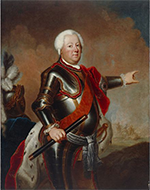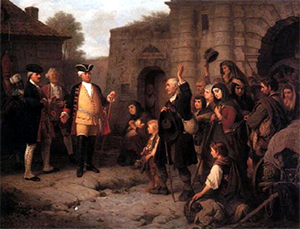Frederick William I: King in Prussia
Frederick William I was King in Prussia for nearly three decades in the early 18th Century. He left his state much better than when he inherited it. 
He was born on Aug. 14, 1688, in Berlin. His father was the reigning Duke of Prussia and Elector of Brandenburg, Frederick I, and his mother was Sophia Charlotte of Hanover. Young Frederick grew up in a time of warfare and political intrigue. His father had allied with other powers against the France of Louis XIV, and that Grand Alliance extended into the fighting over the War of the Spanish Succession, which begun in 1700. That war was winding down when Frederick I died, on Feb. 25, 1713. From that point, Frederick William became Elector of Brandenburg and also the second King in Prussia. He inherited a bountiful royal treasury, which he decided not to keep for himself. Trained as soldier, Frederick William ran his kingdom that way, preferring austerity and frugality in his own personal life and encouraging his subjects to pay taxes in order to support the growing infrastructure begun by his father and his grandfather; to that, the new king added hospitals and schools. He also encouraged his own government officials to follow the rules set out in his blueprint for good governance the Regulations for State Officials. Also continuing the work done by his two immediate predecessors, he intensified the training of and otherwise strengthened the weaponry and effectiveness of the army. 
European powers in the previous century had fought wars over religion. In the time of King Frederick William I, such wars were more infrequent; however, tensions over beliefs remained. Like his predecessors, the king was a Protestant, or basically a Christian who wasn't Catholic. In 1732, he welcomed a large number of Protestants from Salzburg to resettle in Prussia; about 20,000 did so, their journey made peaceful by an escort of Prussian officials that included the king himself, who sang hymns with the new arrivals. Prussia and Sweden had been enemies more than once in the preceding century, and it was so again in the Great Northern War, in which Frederick William aligned himself with Peter the Great of Russia to fight against Sweden. That alliance gained victory, and Prussia's share of the spoils included some new ports on the coast of the Baltic Sea. Another conflict in which Prussian troops were involved was the War of the Polish Succession. Frederick William had allied with Austria and Prussia in support Manuel of Portugal rather than the two Polish contenders, Augustus III and Stanislaus Leszcyński. That support proved unwarranted, as Augustus III eventually kept the throne. The king had married Sophia Dorothea of Hanover in 1706. They had 14 children, 10 of whom survived into adulthood: Friedrike Wilhelmine (1709), Frederick (1712), Frederica Louise (1714), Philippine Charlotte (1716), Sophia Dorothea (1719), Louisa Ulrika (1720), Augustus William (1722), Anna Amalia (1723), Frederick Henry Louis (1726), and Augustus Ferdinand (1730). 
As the firstborn son, Frederick was the king-in-waiting. When the boy was just 6, his father, who wanted a natural born soldier as an heir apparent, ordered him to start military drills with a bunch of other children. Frederick endured the commands but was much more at home in the realm of the arts and letters, embracing great works of literature and music and, to his father's horror, French culture. Father and son had many run-ins. Frederick suffered beatings and other punishments, including one high-profile imprisonment and exile from court. The two eventually grew closer together, but the relationship was not in an ideal state when Frederick William died, on May 31, 1740. Having been handed a kingdom strong in its economics, culture, and (most of all) military, Frederick II carried on the proud tradition, having such success that he is remembered to history as Frederick the Great. |
|
Social Studies for Kids
copyright 2002–2026
David White




